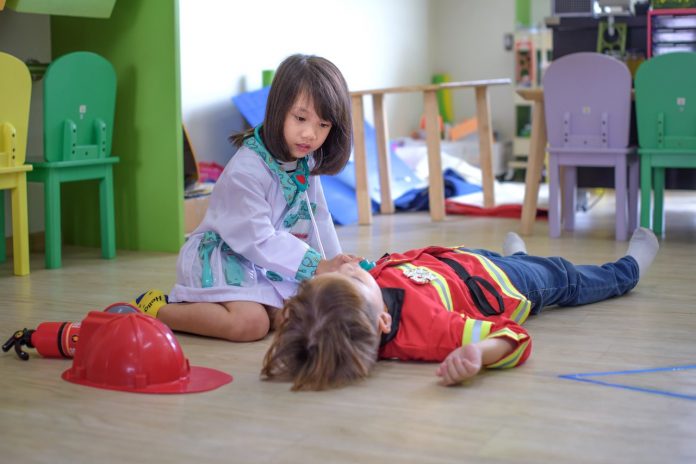Scientists from the University of Konstanz and Thurgau University of Teacher Education investigate the importance of social pretend play for children’s social-emotional development, suggesting educational strategies to support children’s play
Children’s competence to form social relations outside their family, especially with peers, undergoes substantial developmental changes during early childhood. These changes can be seen on the behavioural, cognitive, emotional, and social level. In line with other developmental processes, children’s social pretend play competences emerge and grow from toddler to early school age. We think that in some preschool or early school settings and curricula the developmental significance of play is nowadays undervalued.
Why is social pretend play important?
Social pretend play is an activity through which children may acquire and train social-cognitive, emotional, and social skills. In particular, pretend play allows children to create different make-believe scenarios in which they can take on different roles and perspectives. Herein, children have the possibility to experiment with themselves, their peers, adults, and their environment. Children can experience positive interactions with their peers like sharing, asserting, waiting, and role-taking. Moreover, their social-cognitive abilities such as understanding of emotions are challenged. Therefore, social pretend play is an ideal ground for developing social-emotional skills and positive peer relations (Perren et al., 2019).
How does social pretend play competence develop?
Children start showing pretence activities in their play around 15 months of age. The development of pretend play follows a normative pattern. That goes from decentration, a shift from self to other as the agent, to decontextualisation, a more frequent use of imaginary objects and actions in pretence, to integration, where several pretend acts form entire sequences and narratives. Roots of pretend play can be found in the early interaction between children and parents. Pretend play develops from playing by oneself to playing with others parallel, associative, and finally cooperative. Around the age of three, many children start attending some form of preschool setting where the opportunity to play with peers is increased. As soon as peers become the preferred play partners, level and duration of pretend play tends to increase. Peers also have an impact on the quality of social pretend play (Jaggy et al., 2020a).
How can social pretend play competence be assessed?
Besides the normative developmental patterns described above, children differ in their propensity of engagement in (social) pretend play and their social pretend play competence. In our research, we assess children’s different developmental level of social pretend play with questionnaires or standardised tests (Jaggy et al., 2020b) and evaluate children’s social pretend play quality by observing children’s actual play behaviour with peers (Perren et al., 2019). How does high social pretend play quality look like? It involves high levels of decentration (e.g. child applies a bandage to another child), decontextualisation (e.g. child is holding an invisible phone to call the firefighters), planning (e.g. child communicates to co-players what they will play next: “Now we have dinner and afterwards there is a fire starting and we ring the fire alarm), role-taking (e.g. child is acting continuously in his/her role as an emergency doctor) and sequencing (e.g. child first goes to the shop to buy groceries, then cooks, then it is preparing the table and is finally sitting down to eat).
How can we promote social pretend play quality?
Some researchers proposed that especially the quality of play might be critical for the developmental benefit of pretend play. Our research confirms that higher social pretend play competence is associated with better social-emotional skills (Jaggy et al., 2020b). Promoting children’s social pretend play level might therefore be an educational pathway to improve children’s social and emotional development. We investigated which educational strategies can effectively foster children’s social pretend play quality. The results showed that active support provided by the play tutor (active play participation, modelling and prompting) was positively linked to the level of social pretend play (Perren et al., 2019). In another study, children were randomly assigned to a play tutoring condition, a roleplay material condition, and a treatment as usual condition. The study suggests that providing roleplay material stimulates children to engage in social pretend play, but adults’ play support increases the quality of social pretend play (Kalkusch et al., 2020).
Conclusion
Social pretend play provides children with an ideal ground for developing social-emotional skills and should be promoted in preschool. The main task for educators is to provide time and space for children’s play with peers and (from time to time) to enrich children’s play ideas through the provision of material, prompting and modelling (e.g. through playing along). It is important to keep the balance between self-initiated, self-motivated, and joyful play and giving children active play support.
References
Jaggy, A.-K., Mainhard, T., Sticca, F., & Perren, S. (2020a). The emergence of dyadic pretend play quality during peer play: The role of child competence, play partner competence and dyadic constellation. Social Development. DOI: 10.1111/sode.12445
Jaggy, A.-K., Perren, S., & Sticca, F. (2020b). Assessing Preschool Children’s Social Pretend Play Competence: An Empirical Comparison of Three Different Assessment Methods. Early Education and Development. DOI: 10.1080/10409289.2020.1712633
Kalkusch, I., Jaggy, A.-K., Burkhardt Bossi, C., Weiss, B., Sticca, F., & Perren, S. (2020a). Promoting Social Pretend Play in Preschool Age: Is Providing Role Play Material Enough? Manuscript submitted for publication.
Perren, S., Sticca, F., Weiss-Hanselmann, B., & Burkhardt Bossi, C. (2019). Let us play together! Can play tutoring stimulate children’s social pretend play level? Journal of Early Childhood Research. DOI: 10.1177/1476718X19849248
Please note: This is a commercial profile











